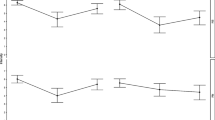Abstract
Positive psychology has been increasingly moving towards testing interventions to increase positive outcomes and decrease negative outcomes. One of these possible interventions involves increasing savoring the moment. During savoring the moment, one focuses on positive events while they occur to increase, intensify, or prolong positive emotions in the present. This study tested a group savoring the moment intervention to increase positive outcomes and decrease negative outcomes over 2 weeks. The sample consisted of 193 undergraduate students who completed both sessions (94 intervention and 99 control condition). The intervention group experienced significant decreases in self-reported depressive symptoms and negative affect when compared to the control group. However, positive affect did not differ between the groups. Clinical and research implications are explored.
Similar content being viewed by others
References
Aldea, M. A., Rahman, O., & Storch, E. A. (2009). The psychometric properties of the Florida obsessive compulsive inventory: Examination in a non-clinical sample. Individual Differences Research, 7, 228–238.
Beck, A. T., Steer, R. A., & Brown, G. K. (1996). Manual for Beck depression inventory-II. San Antonio, TX: Psychological Corporation.
Brown, K. W., & Ryan, R. M. (2003). The benefits of being present: Mindfulness and its role in psychological well-being. Journal of Personality and Social Psychology, 84, 822–848.
Bryant, F. B. (1989). A four-factor model of perceived control: Avoiding, coping, obtaining, and savoring. Journal of Personality, 57, 773–797.
Bryant, F. B. (2003). Savoring beliefs inventory (SBI): A scale for measuring beliefs about savouring. Journal of Mental Health, 12, 175–196.
Bryant, F. B., & Veroff, J. (2007). Savoring: A new model of positive experience. Mahwah, NJ: Lawrence Erlbaum Associates.
Chamorro-Premuzic, T., Bennett, E., & Furnham, A. (2007). The happy personality: Mediational role of trait emotional intelligence. Personality and Individual Differences, 42, 1633–1639.
Chang, V. Y., Palesh, O., Caldwell, R., Glasgow, N., Abramson, M., Luskin, F., et al. (2004). The effects of a mindfulness-based stress reduction program on stress, mindfulness self-efficacy, and positive states of mind. Stress and Health, 20, 141–147.
Cohen, J., Cohen, P., West, S. G., & Aiken, L. (2003). Applied multiple regression/correlation analysis for the behavioral sciences. Mahwah, NJ: Lawrence Erlbaum Associates.
Dozois, D. J. A., Dobson, K. S., & Ahnberg, J. L. (1998). A psychometric evaluation of the Beck depression inventory-II. Psychological Assessment, 10, 83–89.
Emmons, R. A., & McCullough, M. E. (2003). Counting blessings versus burdens: An experimental investigation of gratitude and subjective well-being in daily life. Journal of Personality and Social Psychology, 84, 377–389.
Fredrickson, B. L., Tugade, M. M., Waugh, C. E., & Larkin, G. R. (2003). What good are positive emotions in crises? A prospective study of resilience and emotions following the terrorist attacks on the United States on September 11th, 2001. Journal of Personality and Social Psychology, 84, 365–376.
Giuliani, N. R., McRae, K., & Gross, J. J. (2008). The up- and down-regulation of amusement: Experiential, behavioral, and autonomic consequences. Emotion, 8, 714–719.
Hurley, D. B. (2007). Making the most of good times: Examination of savoring, attributional style, and positive events. Unpublished master’s thesis Washington State University, Pullman, Washington.
Hurley, D. B., & Kwon, P. (2007). Prediction of positive outcomes through savoring and positive events. Poster session presented at the annual meeting of the American Psychological Association (Division 8), San Francisco, CA.
Kurtz, J. (2008). Looking to the future to appreciate the present. Psychological Science, 19, 1238–1241.
Landa, J. M. A., Lόpez-Zafra, E. L., de Antonana, R. M., & Pulido, M. (2006). Perceived emotional intelligence and life satisfaction among university teachers. Psicothema, 18, 152–157.
Marlo, H., & Wagner, M. K. (1999). Expression of negative and positive events through writing: Implications for psychotherapy and health. Psychology and Health, 14, 193–215.
Mayer, J. D., Salovey, P., & Caruso, D. R. (2004). Emotional intelligence: Theories, findings, and implications. Psychological Inquiry, 15, 197–215.
Otake, K., Shimai, S., Tanaka-Matsumi, J., Otsui, K., & Fredrickson, B. L. (2006). Happy people become happier through counting kindness: A counting kindness intervention. Journal of Happiness Studies, 7, 361–375.
Pavot, W., & Diener, E. (2004). The subjective evaluation of well-being in adulthood: Findings and implications. Ageing International, 29, 113–135.
Peterson, C., & Seligman, M. E. P. (2004). Character strengths and virtues: A handbook and classification. New York, NY: Oxford University Press.
Quoidbach, J., Berry, E. V., Hansenne, M., & Mikolajczak, M. (2010). Positive emotion regulation and well-being: Comparing the impact of eight savoring and dampening strategies. Personality and Individual Differences, 49, 368–373.
Seligman, M. E. P., Rashid, T., & Parks, A. C. (2006). Positive psychotherapy. American Psychologist, 61, 774–788.
Seligman, M. E. P., Steen, T. A., Park, N., & Peterson, C. (2005). Positive psychology progress: Empirical validation of interventions. American Psychologist, 60, 410–421.
Shapiro, S. L., Astin, J. A., Bishop, S. R., & Cordova, M. (2005). Mindfulness-stress reduction for health care professionals: Results from a randomized clinical study. International Journal of Stress Management, 12, 164–176.
Shapiro, S. L., Carlson, L. E., Astin, J. A., & Freedman, B. (2006). Mechanisms of mindfulness. Journal of Clinical Psychology, 62, 373–386.
Speca, M., Carlson, L. E., Goodey, E., & Angen, M. (2000). A randomized, wait-list controlled clinical trial: The effect of a mindfulness meditation-based stress reduction program on mood and symptoms of stress in cancer outpatients. Psychosomatic Medicine, 62, 613–622.
Storch, E. A., Roberti, J. W., & Roth, D. A. (2004). Factor structure, concurrent validity, and internal consistency of the Beck depression inventory—second edition in a sample of college students. Depression and Anxiety, 19, 187–189.
Watson, D., & Clark, L. A. (1999). The PANAS-X: Manual for the positive and negative affect schedule-expanded form. Iowa City, IA: The University of Iowa.
Wood, J. V., Heimpel, S. A., & Michela, J. L. (2003). Savoring versus dampening: Self-esteem differences in regulating positive affect. Journal of Personality and Social Psychology, 83, 566–580.
Author information
Authors and Affiliations
Corresponding author
Rights and permissions
About this article
Cite this article
Hurley, D.B., Kwon, P. Results of a Study to Increase Savoring the Moment: Differential Impact on Positive and Negative Outcomes. J Happiness Stud 13, 579–588 (2012). https://doi.org/10.1007/s10902-011-9280-8
Published:
Issue Date:
DOI: https://doi.org/10.1007/s10902-011-9280-8




